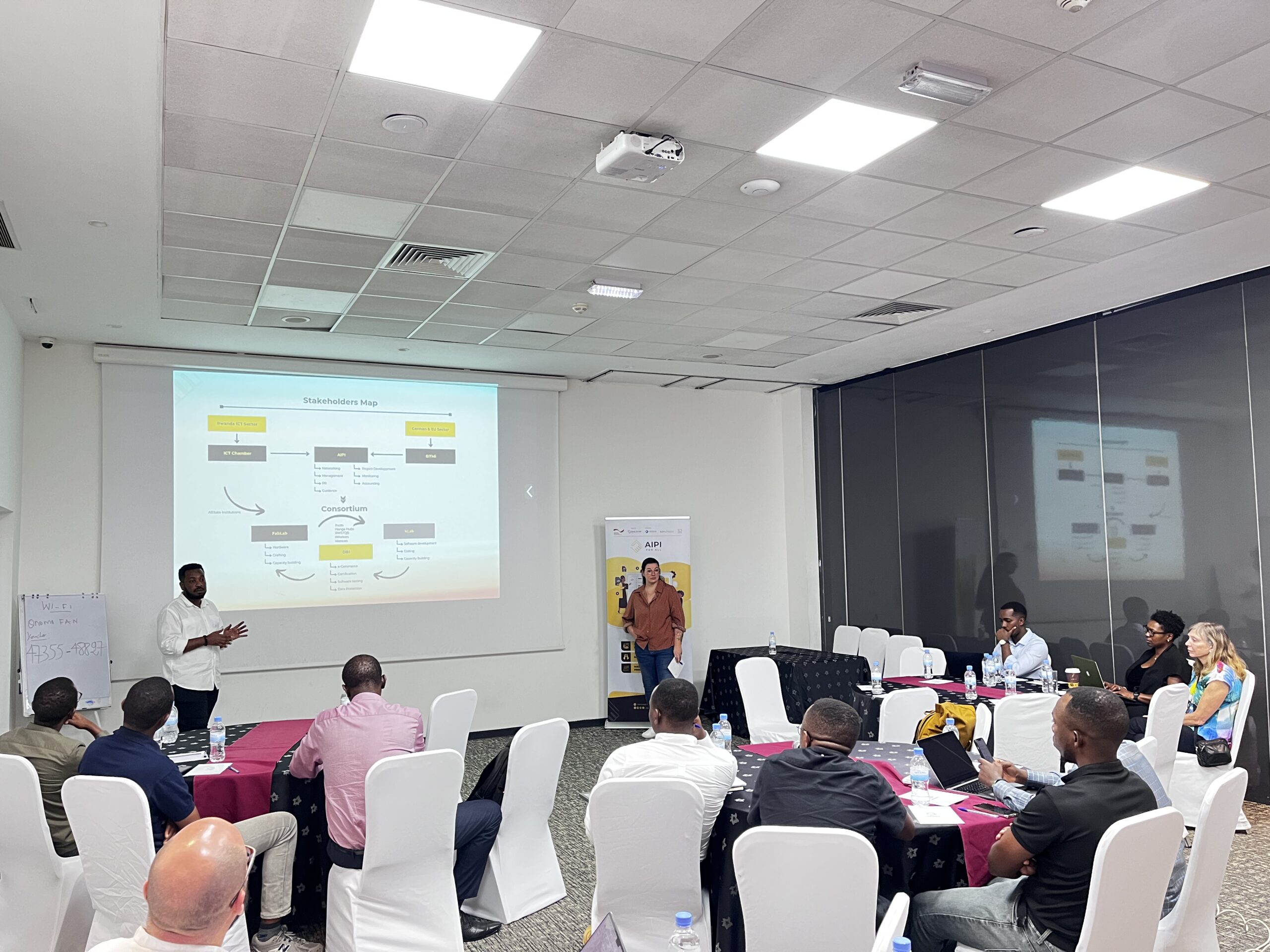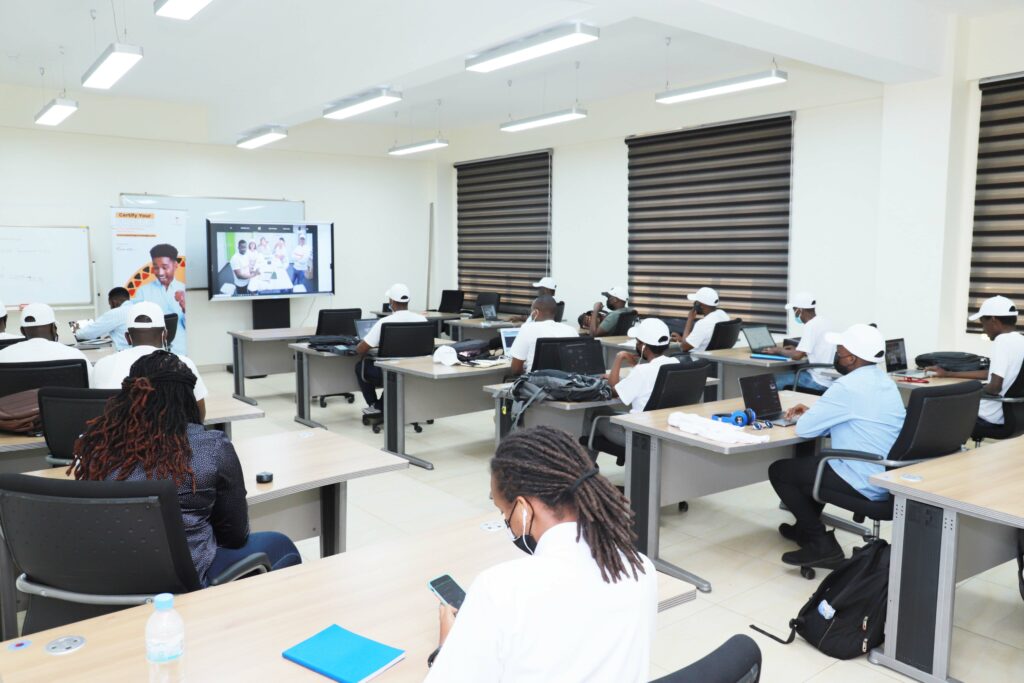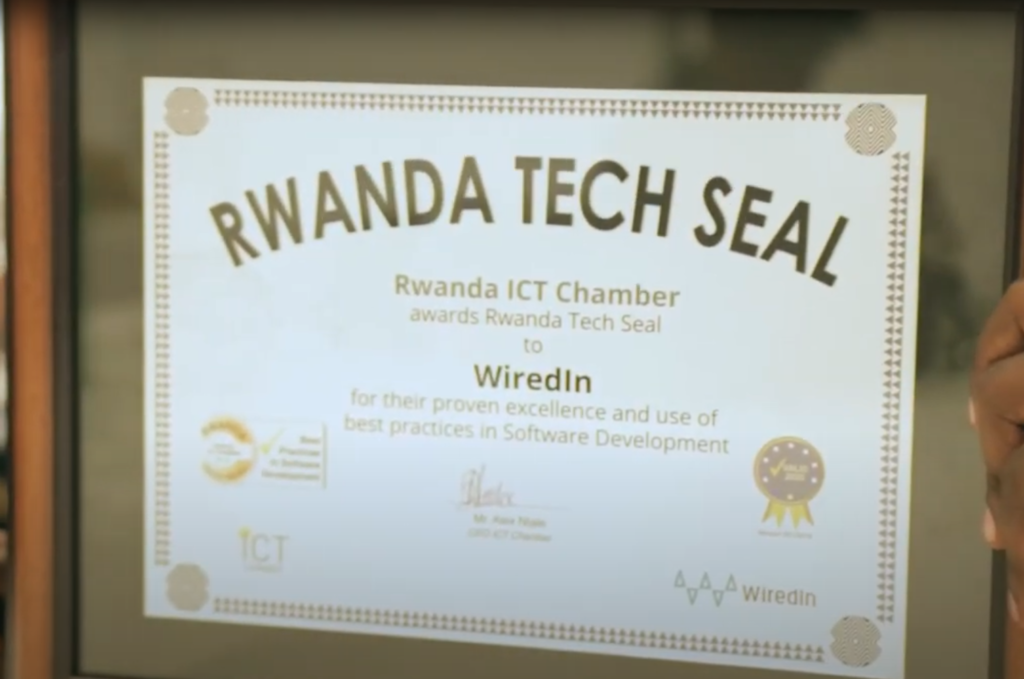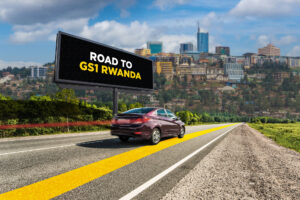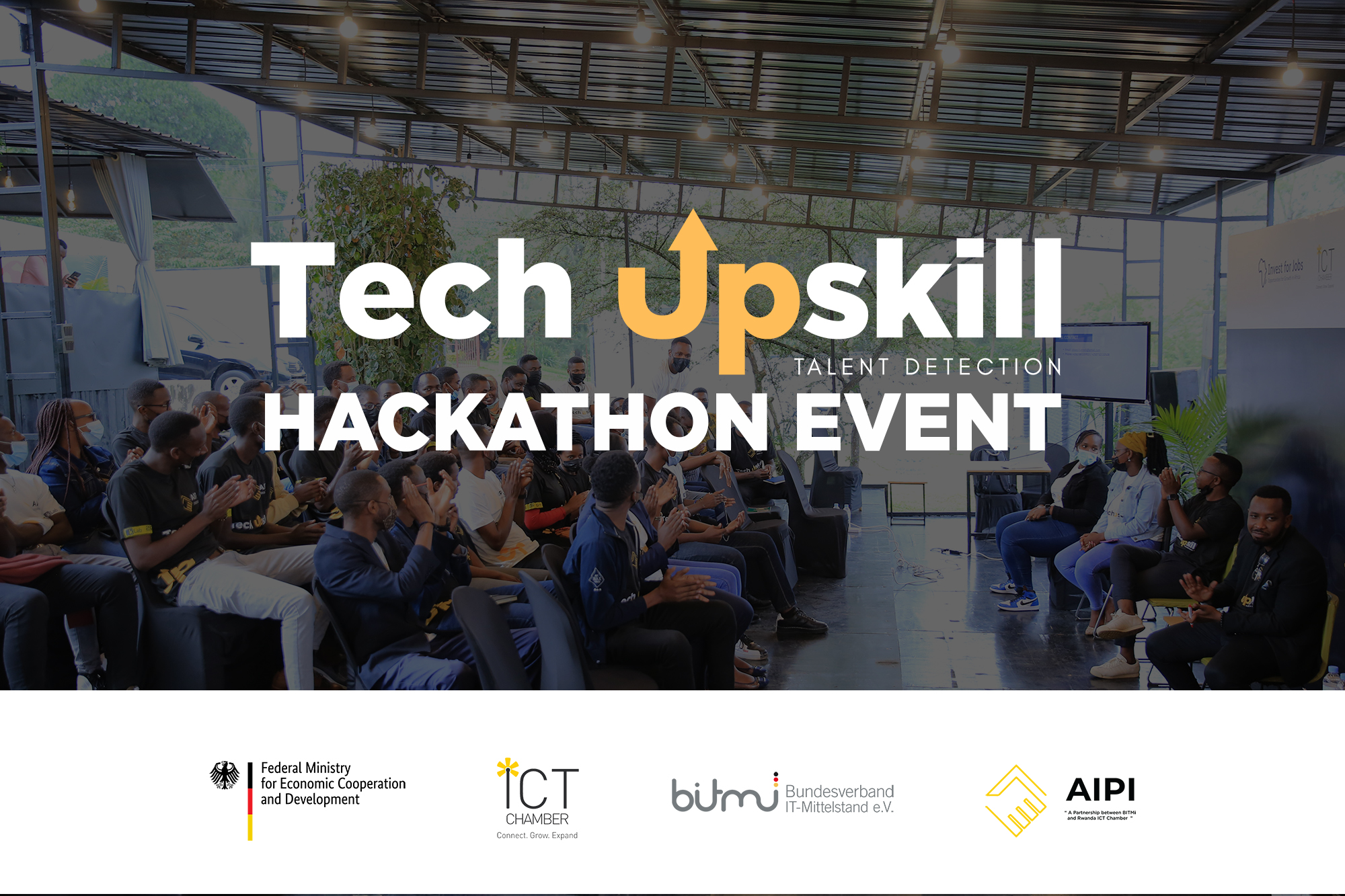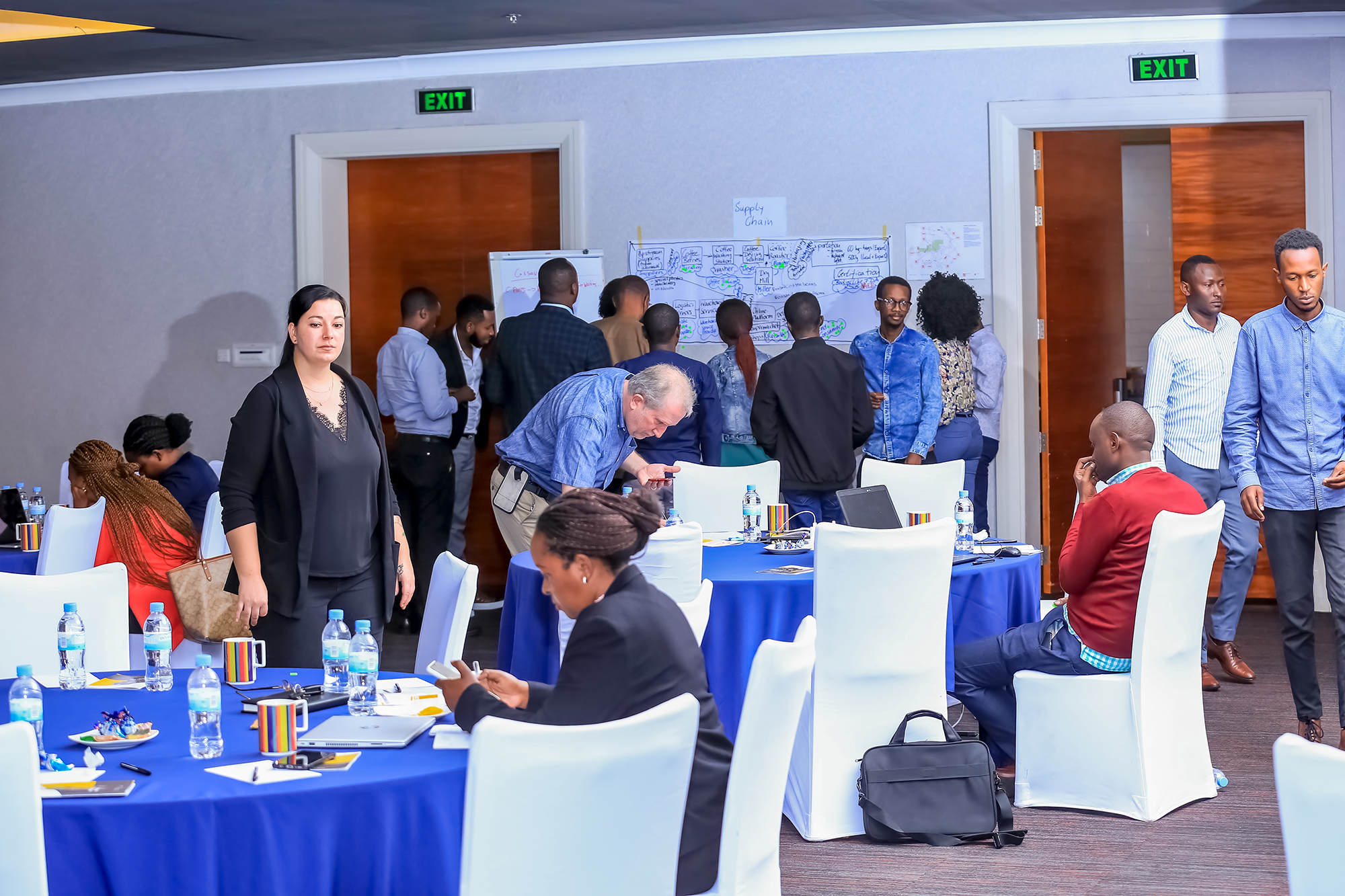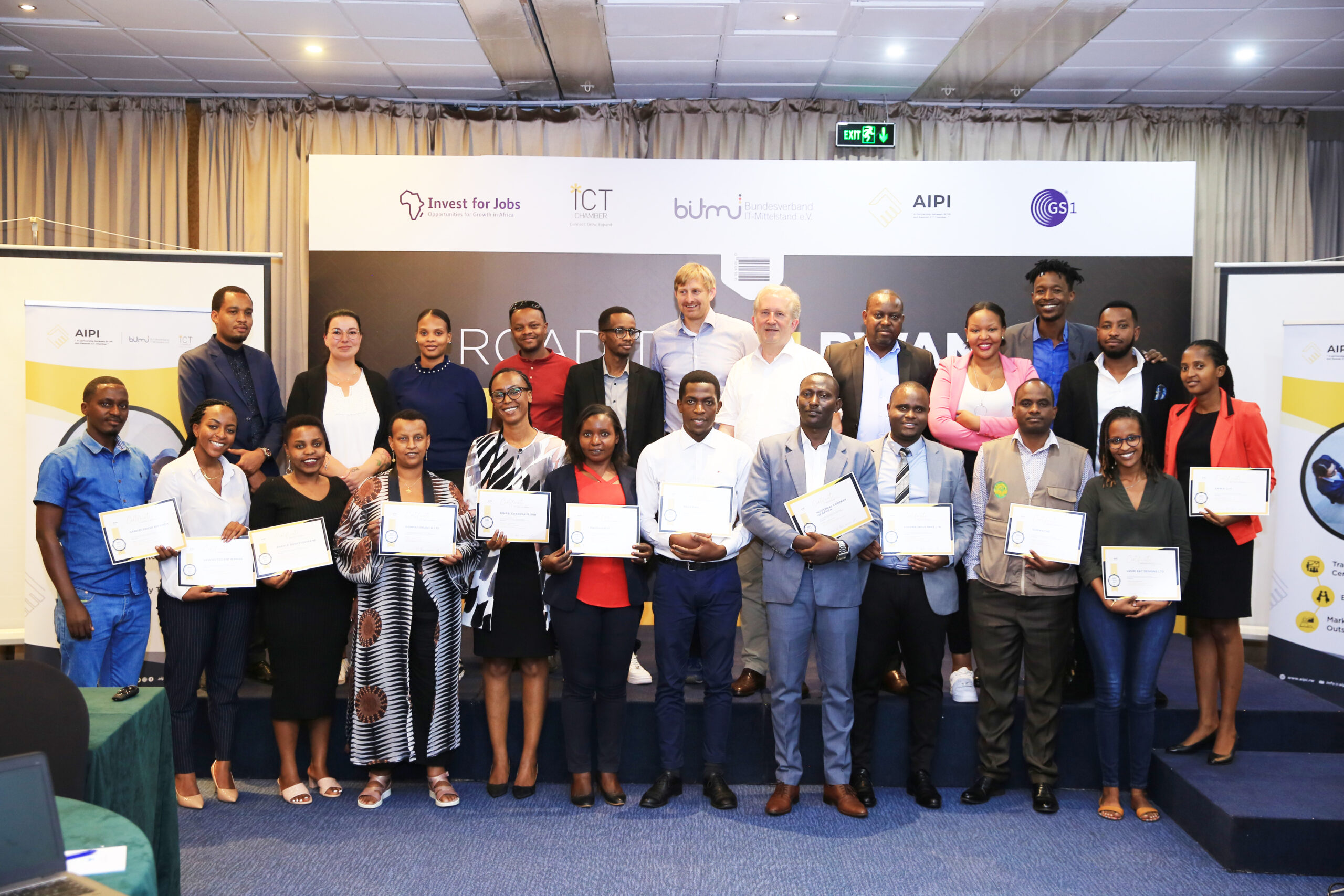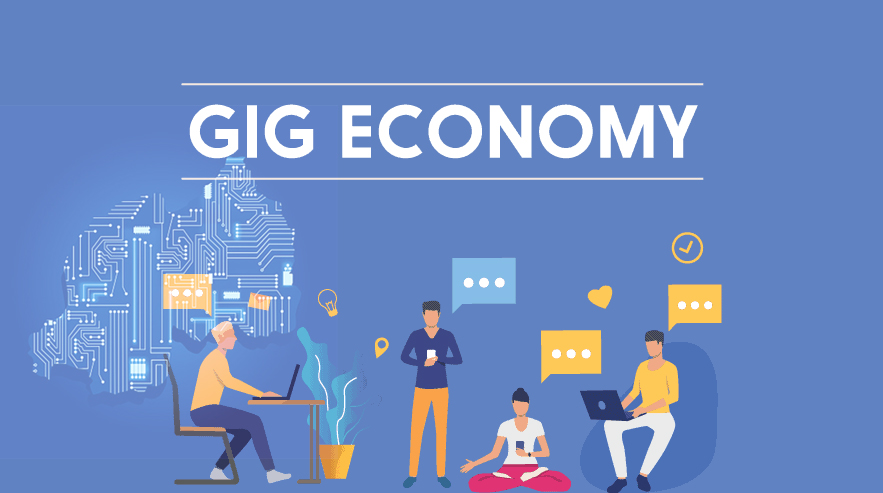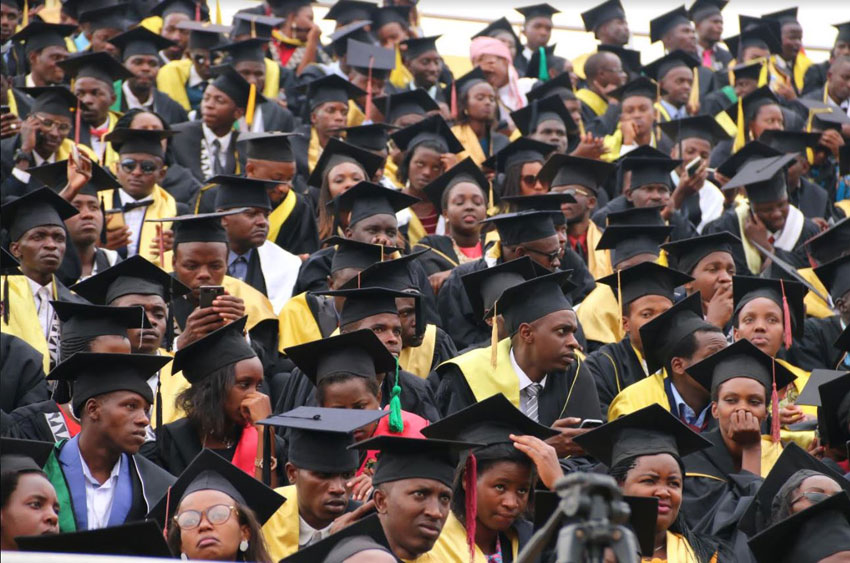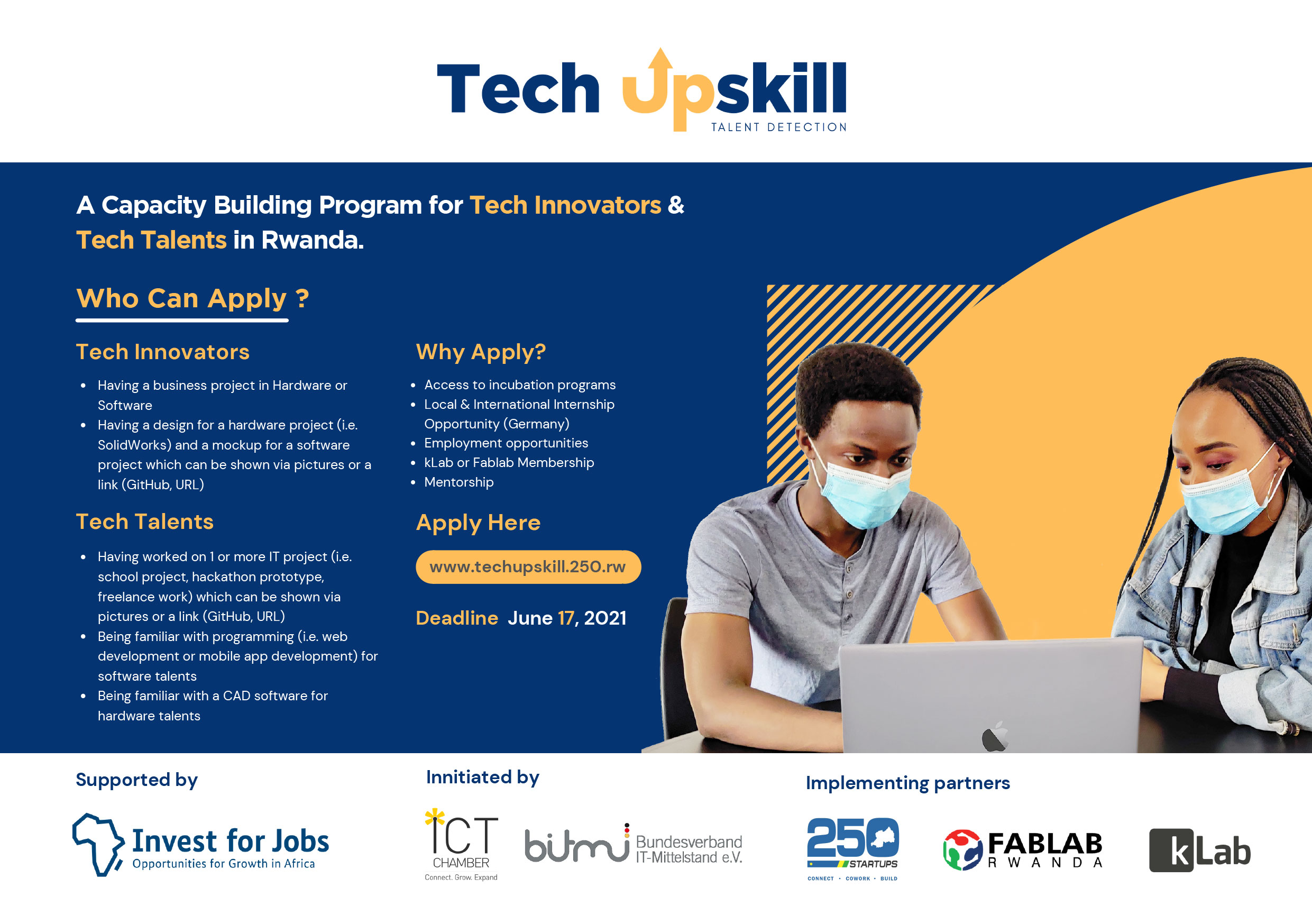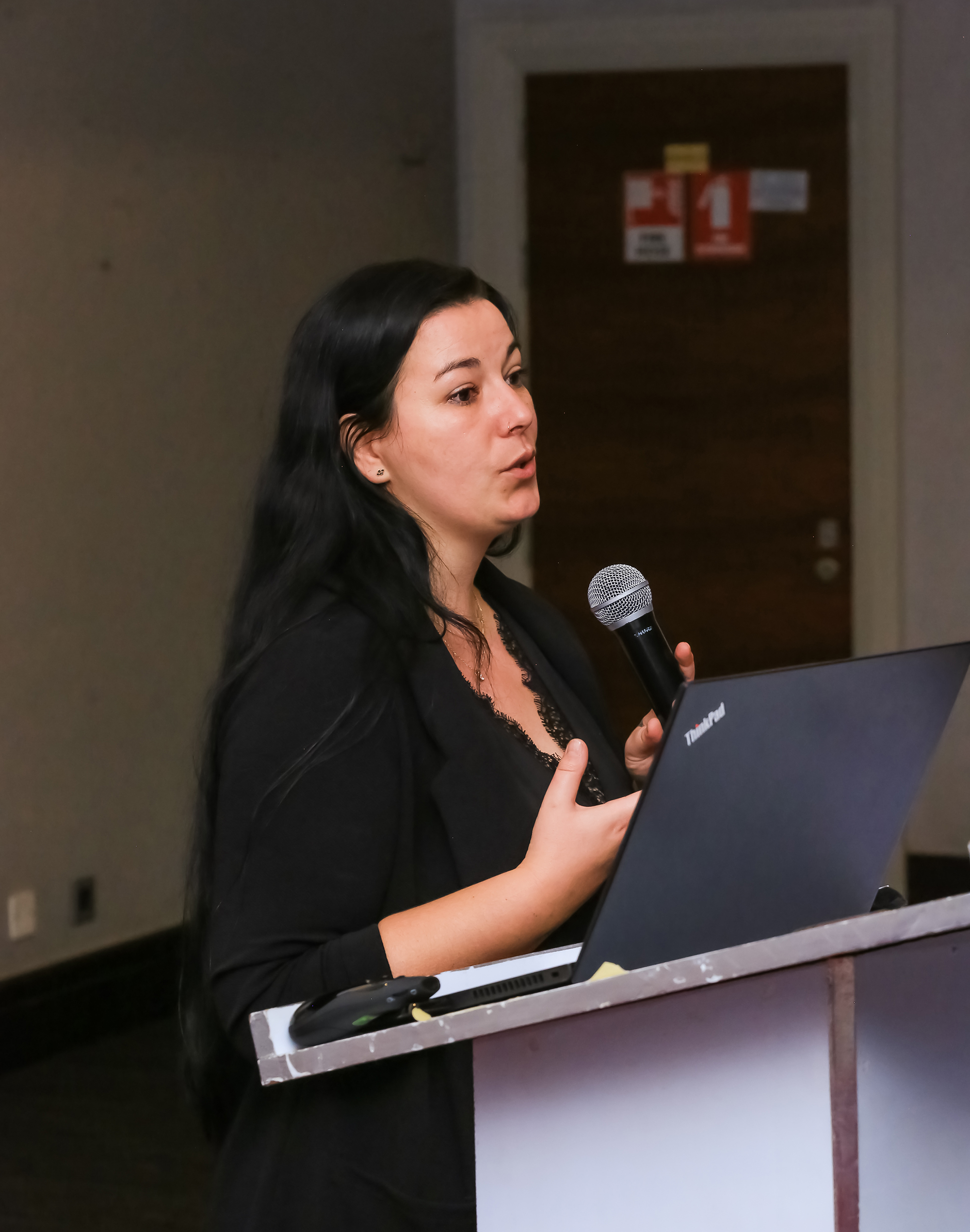
Closing remarks from Dr. Geraldine Schmitz
We are now coming to the end of our second GS1 workshop. I would like to thank all of you for coming. In addition, I would like to thank Tim, Niklas and Andreas for teaching us so much about the GS1 system and what we can do. You guys put a lot of work into this project – we appreciate it. The biggest thank you goes to my beloved team at AIPI: Chris, Philly, Joy, Yves and Samuel. You guys are awesome.
Before we hand out certificates and move on to the fun part with the cocktails, let me explain what GS1 Rwanda can mean.
I have been working on this continent for twelve years now and lived in West Africa for several of those years. And whenever I told people in Germany about my work as an anthropologist in West Africa, they were surprised. Surprised that I had the best phone connection, could travel safely, children going to school… And now imagine when I tell you about Rwanda: Drone programs, robots in hospitals, 60% women in parliament! – I wish we had even a rudiment of that number in Germany… I tell them how beautiful, modern, digitalized, cosmopolitan and friendly Rwanda is and the reaction is very often doubt and surprise. Often they would rather believe me that the sky is green than that Rwanda has the Irembo platform.
Why is that? – Because the media and not least the so-called development institutions serve the image of the poor continent and transport it to the global north. Yesterday we heard something about the supply chain of coffee from Rwanda. I would now like to tell you what happens to the coffee in Germany. There are three possibilities:
The coffee arrives in a 60 kilo bag in some factory and disappears as “just coffee from nowhere” in a package. No one knows that at least a part of the coffee comes from Rwanda. The profit for the farmer and the company are minimal.
The coffee is packaged in Rwanda – with or without GS1 code – in, say, 1 kilo packages. This pack of coffee is bought with 99 others from a wholesaler and ends up in a so-called “One World Shop”. One world store… isn’t that nice? We live in one world, but the farmer and the local company has a small profit again, because these stores can be found in many cities in Germany, but they are special stores, where besides coffee you can buy “traditional” jewelry from Africa, Asia and Latin America. Or handmade figurines supposedly made in Africa. You and I know these figurines. Tourists can buy them in Kimironko market and we know that a large part of them is not made in Rwanda, but in Asia. No margin for the Rwandan artisans.
Back to the coffee at the One World Shop: A kilo of coffee at the One World Shop costs more than 20 Euros. It’s labeled fair trade and organic and handmade, and usually made with love. Isn’t that nice? The design is either just a white note stuck on the black packaging, or a photo of the farmer. The farmer is always insanely happy in the photos, loves his work, sniffs the coffee as if there was nothing better in the world and just thinks it’s great that his product is sold so realistically in the One World Shop. I wonder if he knows that a kilo costs over 20€… And these 20€ are not bought by the normal coffee consumer in Germany. The normal consumer buys his coffee in the supermarket for 6-16€ per kilo. So who buys the One World Coffee? – Maybe me, if I want to give it as a fancy gift to Niklas from GS1 Germany, who loves coffee. Because Rwandan coffee with the super happy farmer is not normal coffee – no it is a specialty. Again I wonder if the farmer knows about this.
The third possibility where the Rwandan coffee ends up are in fancy cafés in big cities. I like to call them hipster cafés. A cup of coffee then also costs sometimes 5 euros or more. Such cafes are a bit like One World stores, just cooler. The barista who explains to you that you do not get a shot of milk in your already paid coffee, because it ruins the taste and that’s just not right (true story), then explains to you that this coffee is sooo special. Most of these cafés also have online stores. There the kilo of Rwandan coffee costs 30€. I have to ask myself again how much of the 30€ will reach the farmer and the local company. Have I missed something and all the farmers in Rwanda are rich people? – Maybe. Either way, the coffee bean again does not end up with the normal consumer.
What does my little, mean digression have to do with GS1 now? In all cases, a GS1 code is not mandatory. In case number one, the GS1 code, if it is one, ends up on the bag. It is the export company’s code, not the producer’s. In cases two and three, the target group even likes it when there is no standardized code on the packaging, because it is a specialty! GS1 codes can also be used for specialties, of course. But above all, GS1 standards make sense and are absolutely necessary if I as a producer want to reach the normal consumer in Germany. And that means not niche economies like One World Shops, but the shelves of supermarkets. Although coffee doesn’t cost €30 there, a lot of it is sold. And more of the margin goes to the farmer and the local company.
I know I’m being very cheeky right now, but it doesn’t help the coffee farmer much to be in a cooperative if the end product is only sold in small stores in big cities in Germany. Don’t get me wrong, I’m not talking about local collectivist cooperatives. I am talking about the touted international cooperatives that attract attention in Europe and serve like every stereotype of the continent. Back to the farmer: coffee cooperative X brings him pretty little advantage. Especially when you keep one thing in mind: The coffee is sold in Germany for 30 Euro, because the German company behind advertises with „fair trade“, „happy farmers“, „fair payment“. The consumer things he contributes to the wellbeing of local farmers, if he or she spends 30 Euro instead of 15 Euro. – Wanna know how much the farmer is paid in Rwanda for the 30 Euro sold one kilo coffee? – 55 Cent! Let’s skip the part where I speak out how „not fair“ this trade is. It’s obvious.
The crazy part is, that the 55 Cent are not more than a farmer gets for local sold coffee brands. So for the farmer and respective the local company it doesn’t help much to sell their coffee to international „better world cooperatives“. But they would profit, if their product is sold in supermarkets as a mass product. Why shouldn’t work something for Africa what works for Asian or Latin American countries? – The explanation has historical roots. It has to do with coffee again, but above all it has to do with history. That history is called colonialism and slavery. Both have been officially abolished, but especially in the case of colonialism, the feeling never leaves me that it is hiddenly still there. So-called development models are still being imposed by foreign companies, states and organizations. – Said the whitey in an international project – I see the irony.
We as AIPI cannot improve the image of this continent through targeted marketing and even though I try regularly, I cannot change the whole development policy of Europe. I cannot even convince them to delete this false and idiotic term development… But you and we can create a structure of standards that will bring the Rwandan coffee bean, the Rwandan tea, the handicrafts, the eucalyptus out of the specialty cafes and One World stores and into the supermarkets.
I don’t think I need to explain to you that this brings more profit. That’s clear, that’s why we’re here. But it also has another benefit: Good products help to improve a country’s image and create awareness. You can launch as many well-intentioned campaigns as you like. In the end, it’s always business that drives economies and builds cultural bridges. Goods never just transport things, they also transport information. The history of the world shows it: Cultural and social exchange are always based on economic exchange. These thinks are linked in a never ending cycle.
In the last three years, I have learned a lot about Rwanda. And one of the best things about this country is the willingness of its people to work together to move their country forward. By founding GS1 Rwanda, you can build economic and therefore cultural bridges. On the one hand, you do so, so that your company and your economy prosper more. But with this action you can also work indirectly and directly on the image of your country and your continent. The better the image, the more investors.
Let’s stop thinking small: a small farmer initiative here, a supporting development project there. I don’t want to criticize all of them, but in my social environment – before I told you about it – nobody knew that there are great products in Rwanda. And at the end there‘s an overall observation: If all those initiatives would have worked out, why is the farmer still getting just 1,8% from the coffee price? That’s ridiculous.
GS1 standards are something big. They are the global standard used all over the world to facilitate economic activity. GS1 Standards are a connector that does not discriminate between cultures. GS1 Standards are the global language of business. Supermarkets or malls in Germany don’t care where a product comes from, as long as they make money from it. But they can’t make money on it if the logistical effort is too big. And it’s only the GS1 standards that minimize the logistical effort for the retailer.
And GS1 Rwanda as an organization can do even more. Leave out the GS1 label for a moment. Imagine a community of manufacturers, logistics and retailers who regularly exchange ideas to find solutions to their problems, establish contacts and think up innovations. GS1 is just the tool you use. With your initiative and the GS1 tool, you not only have easier access to GS1 standards. You have control over your product, whether it’s in a cold chain, or on its way to the port in Mombasa, or while it’s being administered to a patient, or even while it’s out in the field grazing. With interoperability assured, you no longer have to sell your product as „coffee from nowhere“, but can get your own brand into supermarkets around the world.
Don’t get me wrong. After building up GS1 Rwanda, there are more things for you to do to sell your product as a mass product. Most importantly, this involves customized marketing. But within the built community you don’t have to do that alone anymore. You can bundle your resources, you can support each other. If you want you can build a task force that is only taking care of this one issue bringing you a headache. Sure, you could just establish a business community. You don’t need GS1 for that. But all major retailers in Europe use GS1 standards exclusively. Without them, you can’t get on the shelf. So on the one hand you’re profiting from the community and from the other hand you profit from the collectively used tool called GS1. – I think its worth the effort you’ll have at the beginning.
Before I come to an end, I would like to tell you a story from my time in Ghana. Because maybe some of you are thinking: Why should I work with a competitor in a community?
As a young anthropologist, I lived and worked in Northern Ghana. I was doing research on local markets. You know them: These local markets are mostly run by women and account for 80% of the total economy in Ghana. The reason for this high percentage is that the government provides no security for small and medium enterprises at all. Therefore, a stable economic but also social network is needed for the population to make ends meet.
During my field research I wanted to buy my cigarettes at a small shop in the Central Market in Tamale, as usual. At this shop, three female traders sit next to each other. All three sell the same cigarettes. Whenever I bought cigarettes, I got them from the trader Ayi. One day, however, Ayi was not at the shop.
One of the other two traders gave me cigarettes from Ayi’s table and put my money in Ayi’s cash register. I would have bought the cigarettes from one of the other two as well. – When I asked Memunatu, one of the other traders, explained: „Seminga, look… Siblings are often rivals in childhood when they play with each other. But when another, older, stronger child comes along, they are no longer rivals, but ally against the stronger child.“
In this illustration, the local traders are the siblings, and the supermarkets and the state are the stronger child. The small traders in the market always compete with supermarkets, all of which are large corporations and state-sponsored. Without cooperation within their network, they would lose out. But thanks to their highly cooperative network, they not only remain competitive. In fact, so-called market women in Ghana are among the most stable and, in some cases, the highest income earners.
Here in Rwanda, the state is not the problem. Rather the image of the continent and competition from other countries. What Ayi and her colleagues don’t know: There is a fancy term for such economic behavior. Coopetition. A mix of Cooperation and Competition. And it’s not just the informal networks that practice coopetition. Volkswagen and Ford are cooperating when it comes to digitizing their car systems. And they are not the only ones. You can have a common goal even though you’re in competition with each other.
So let’s build a strong community and start to beat the bigger child.
